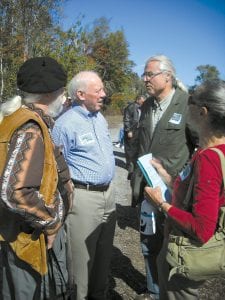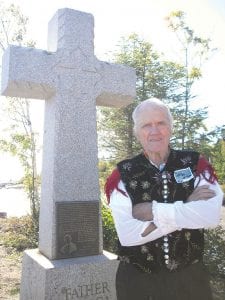Above: (L-R) Native American/Scandinavian musician Larry Martin, former U.S. Congressman Jim Oberstar, Father Michael Tegeder of Gitchitwaa Gateri (a Catholic parish in Minneapolis), and Native American musician Claire Martin chat before a celebration of Father Frederic Baraga’s legacy at the Father Baraga Cross in Schroeder on September 15. The event brought together Slovenian Americans, Catholics advocating for Baraga’s sainthood, and Catholic Native Americans who remember Baraga’s dedication to the Native people in the 1800s. Right: Yul Yost, born and raised in Slovenia, is a Father Baraga historian who has done a lot to keep Baraga’s memory alive. He was integral in organizing this event.

Six days short of the 189th anniversary of the ordination of Father Frederic Baraga, a celebration was held at the cross that bears his name on the shoreline of Lake Superior in Schroeder. A crowd of disparate people gathered under the sunshine on September 15, 2012 to remember the Catholic priest who is in the process of being considered for sainthood.
People had traveled there from Finland, Ely, Biwabik, Mathomedi, the Twin Cities, Marquette, Michigan, and even Alabama.
Slovenians
A sizeable contingent of Branch 109 of the Slovenian Union of America known as the Twin Cities Slovenians was there for the “Baraga Rendezvous,” as past president Norm Setniker called it. Some of them were “muckety muks,” he said.
Father Baraga came to the United States from his home country of Slovenia after sensing a call to serve the Native people around the Great Lakes. “We as Slovenians feel we have been blessed that he has done so much for the North Shore, for Minnesota, and for the nation,” said Setniker.
Baraga historian and Slovenian Association of America Vice President of Culture and Heritage Mary Lou Volk said Father Baraga moved across 80,000 square miles of wilderness for 37 years, ministering to people in need. “He went to them wherever they were,” she said: “no North Face parka, no Kenetrek snow packs, no down sleeping bag, no polar fleece hat!”
Volk said one “intensely cold night” Father Baraga walked completely exhausted through deep snow, with no streetlights, no hope of a motel with a bed, and no GPS to guide him. “There was no choice but to walk on or to freeze,” she said. “God demands nothing else from you but your good will,” Volk said, quoting Baraga, who forsook a large inheritance to enter the ministry. She said he considered himself rich, writing, “as rich as I have ever been in my life, for I have a satisfied and happy heart.”
Former U.S. Congressman Jim Oberstar might be considered a muckety muk, and he flew in from Washington, D.C. for the event. Bruce Kerfoot drove down from Kerfoot’s Lodge at the top of the Gunflint Trail to pick Oberstar up from the Cook County Airport and take him to the celebration. Oberstar is Slovenian himself and has traveled over to the country that was once part of Yugoslavia.
Rep. Oberstar lauded the Slovenian people for their historic practice of choosing leadership by consent of the people. Since Slovenia achieved its independence from Yugoslavia [in 1991], he said, 90 percent of the populace has been turning out to vote. The country now practices democracy with “the highest regard for human rights in the world,” he said.
Musicians John Stark and Karen Medved played Slovenian “button boxes” while professional tenor Shahzore Shah sang a traditional Slovenian song.
Catholics
Deacon Peter Mueller of St. John’s Catholic Church and Holy Rosary Catholic Church in Grand Portage told the group that this site is used by many denominations. It is the very spot where Father Baraga and a Native companion landed in 1846, having just barely survived crossing Lake Superior in a violent storm. They were on their way to Grand Portage because they had heard of an epidemic there.
Father Baraga’s ministry continues, Deacon Mueller said.
Lenora McKeen of Marquette, associate director of the Bishop Baraga Association, outlined the mission of the organization: to show the love of Father Baraga, educate people on the impact of his ministry, preserve materials related to him, continue his memory with an annual celebration (attended by hundreds of people), and to further the cause of his sainthood – a cause that was begun in 1952.
McKeen stressed the importance of passing knowledge of Father Baraga to future generations so that he would continue to inspire. She issued an invitation to the 2012 celebration in Marquette, where people could tour the house where he spent his last days. “It will take you one step inside the door to feel the presence of the Holy Spirit,” she said.
Proof of two miracles would be needed for Father Baraga to reach sainthood. McKeen said a modern miracle occurred when a parish priest and family members prayed for a woman with a large tumor that was clearly seen on an ultrasound. Father Baraga’s stole was laid on her abdomen during the prayer, and the pain she had been feeling went away. Doctors subsequently performed exploratory surgery and found no sign of the tumor.
Father Baraga once traveled 57 miles to baptize a child who was expected to die, McKeen said. He never let weather stop him. He sometimes had blood on his snowshoes caused by traveling barefoot after giving away his shoes.
Native Americans
Adding another dimension to the celebration was the presence of Father Michael Tegeder (a non-Native) and two Native American parishioners from Gitchitwaa Gateri, a Catholic parish in Minneapolis. “We have a beautiful Indian parish,” Tegeder said.
Father Baraga went to Congress to promote the rights of the Indian people, who were being exploited, Tegeder said. “He saw the beauty of their culture. He saw the spirituality of their culture.”
Larry and Claire Martin (great-granddaughter of the woman Madeline Island was named after) introduced one of the over 100 hymns Father Baraga wrote in Ojibwe. It was entitled Ninzhawendaagoz, which means “I am blessed.” Tobacco was offered, a prayer was spoken in Ojibwe, and while people sang to the accompaniment of an Indian flute, an eagle soared over the treetops next to the group.
Look not mournfully into the past; it cannot return. Wisely improve the present; it is thine. Go forth to meet the shadowy future without fear and with a manly heart.
— Father Baraga



Loading Comments